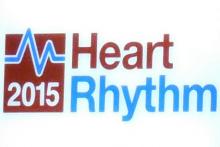BOSTON – Black people with new-onset atrial fibrillation have a 60% increased risk for stroke compared with white people who have incident atrial fibrillation when not maintained on an appropriate anticlotting regimen, according to prospectively collected data from more than 56,000 subjects at a U.S. center.
But in the subgroup of new-onset atrial fibrillation (AF) patients who received appropriate treatment with aspirin or an anticoagulant, the stroke rates among white and blacks equalized. The analysis showed that 46% of the more than 3,000 people who developed AF during follow-up received aspirin if their CHA2DS2-VASc score was less than 2, or anticoagulation with warfarin or a new oral anticoagulant if their score was 2 or greater, Dr. Parin J. Patel said at the annual scientific sessions of the Heart Rhythm Society.
The majority of the followed cohort with incident atrial fibrillation did not receive this treatment, and in the total group, the relative rate of stroke among blacks exceeded that of whites by a statistically significant 60% in an analysis that adjusted for several demographic and clinical features. The excess of strokes occurred at about the same rate in black women compared with white women, and in black men compared with white men, reported Dr. Patel, an electrophysiologist at the University of Pennsylvania in Philadelphia.
The implication is that because their stroke risk is greater, blacks with AF should especially receive appropriate stroke prophylaxis and AF therapy, he said. The overall findings also highlight the substantial stroke risk faced by all AF patients.
The data came from the University of Pennsylvania Atrial Fibrillation-Free study of 91,274 people who underwent an ECG examination in the University of Pennsylvania health system during 2004-2009 along with an index clinical encounter within 30 days. Excluding patients with a prevalent AF or other arrhythmia, prevalent stroke, or incomplete data left 56,835 AF- and stroke-free people to follow for incident AF, which occurred in 3,891 patients. At the time of AF diagnosis, the average age of patients was 63 years; more than a third had hypertension; a fifth had diabetes; and a fifth had heart failure. One-third of the incident-AF group was black, 58% were white, and the remainder were from other demographic groups.
Dr. Patel and his associates defined an AF-related stroke as any that occurred within 6 months before AF diagnosis or anytime after, which occurred in 645 (17%) of the incident-AF patients. The more than 50,000 AF-free people followed in the study had a total of 3,001 strokes not related to AF during follow-up, which meant that 18% of all strokes in the entire cohort were AF related.
Among the 645 AF-related strokes, roughly half occurred during the 6 months before AF diagnosis, and the other half following AF diagnosis. An analysis that focused exclusively on strokes that occurred after AF diagnosis showed that this subset of AF-associated strokes also occurred significantly more often in blacks than in whites.
Dr. Patel had no disclosures.
On Twitter @mitchelzoler


